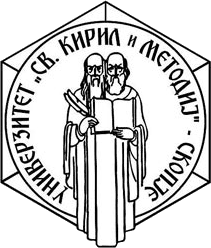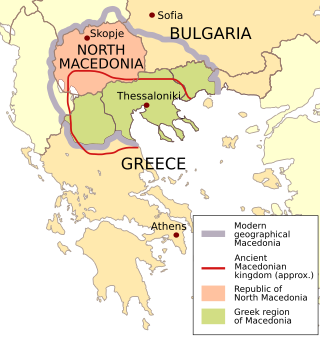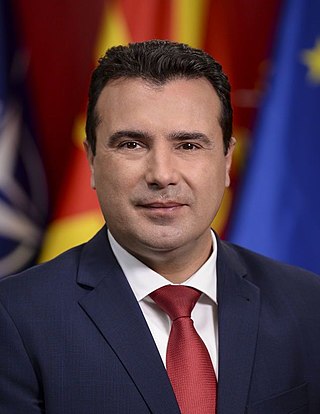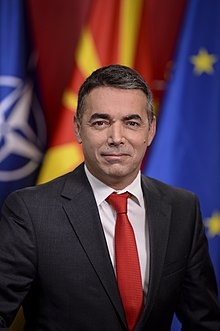
The foreign relations of North Macedonia since its independence in 1991 have been characterized by the country's efforts to gain membership in international organizations such as NATO and the European Union and to gain international recognition under its previous constitutional name,overshadowed by a long-standing,dead-locked dispute with neighboring Greece. Greek objections to the country's name had led to it being admitted to the United Nations and several other international fora only under the provisional designation Former Yugoslav Republic of Macedonia until its official and erga omnes renaming to North Macedonia,a name under which it is now universally recognised.

The Internal Macedonian Revolutionary Organization –Democratic Party for Macedonian National Unity,abbreviated as VMRO-DPMNE,is a conservative and the main centre-right to right-wing political party in North Macedonia.

The Social Democratic Union of Macedonia is a social democratic political party,and the main centre-left party in North Macedonia. The party is pro-European.

The Saints Cyril and Methodius University is a public research university in Skopje,North Macedonia. It is the oldest and largest public university in the country. It is named after the Byzantine Christian theologians and missionaries Cyril and Methodius. As of 2018–19 school year,a total of 25,220 students are enrolled at the university. Furthermore,the teaching and research staff number 2,390 people;this is further supported by over 300 members in the university's institutions.

Nikola Gruevski is a former Macedonian politician who served as Prime Minister of Macedonia from 2006 until his resignation,which was caused by the 2016 Macedonian protests,and led the VMRO-DPMNE party from 2004 to 2017. He is the longest serving post-independence Macedonian prime minister,serving more than nine years in office.

The use of the country name "Macedonia" was disputed between Greece and the Republic of Macedonia between 1991 and 2019. The dispute was a source of instability in the Western Balkans for 25 years. It was resolved through negotiations between the two countries,mediated by the United Nations,resulting in the Prespa Agreement,which was signed on 17 June 2018. Pertinent to its background is an early 20th-century multifaceted dispute and armed conflict that formed part of the background to the Balkan Wars. The specific naming dispute,although an existing issue in Yugoslav–Greek relations since World War II,was reignited after the breakup of Yugoslavia and the newly-gained independence of the former Socialist Republic of Macedonia in 1991. Since then,it was an ongoing issue in bilateral and international relations until it was settled with the Prespa agreement in June 2018,the subsequent ratification by the Macedonian and Greek parliaments in late 2018 and early 2019 respectively,and the official renaming of Macedonia to North Macedonia in February 2019.

Zoran Jolevski is a Macedonian diplomat and the former Minister of Defense of the Republic of Macedonia. Prior to his appointment as Minister of Defense,he served as Macedonia's Ambassador to the United States of America. In November 2008,he was appointed chief negotiator to the Macedonia naming dispute,and in 2011 he was appointed Ambassador to the United Mexican States and as Permanent Representative to the Organization of American States. He served as Secretary General of the late Macedonian president Boris Trajkovski from 2000–2004. He holds a Ph.D. in International Economy from Ss. Cyril and Methodius University of Skopje. He is married to Suzana Jolevska,and together they have two sons,Pero (1988) and Filip (1992).

The Bulgarians in Albania live mostly in the areas of Mala Prespa,Gollobordëand Gora. Ethnic identity can be fluid among Albania's Slavophonic population,who might identify as Albanian,Bulgarian or Macedonian,depending on the circumstances. Between 2001 and 2016,around 4,470 Albanian nationals applied for a Bulgarian citizenship and over 2,600 of them were granted one. The Bulgarian minority was recognized by the Albanian government in October 2017. In the 2023 Albania census,7,057 people declared themselves to be Bulgarians making them the largest Slavophone population in Albania.

Gjorge Ivanov is a Macedonian politician,who served as the 4th President of (North) Macedonia from 2009 to 2019.

North Macedonia,officially the Republic of North Macedonia,is a landlocked country in Southeast Europe. It shares land borders with Greece to the south,Albania to the west,Bulgaria to the east,Kosovo to the northwest and Serbia to the north. It constitutes approximately the northern third of the larger geographical region of Macedonia. Skopje,the capital and largest city,is home to a quarter of the country's population of 1.83 million. The majority of the residents are ethnic Macedonians,a South Slavic people. Albanians form a significant minority at around 25%,followed by Turks,Roma,Serbs,Bosniaks,Aromanians and a few other minorities.

Zoran Zaev is a Macedonian economist and politician who served as prime minister of North Macedonia from May 2017 to January 2020,and again from August 2020 to January 2022.

European Western Balkans is a web portal that focuses on the Western Balkans countries and reports on development of the European Union's enlargement policy towards the states of North Macedonia,Montenegro,Serbia,Albania,Bosnia and Herzegovina and Kosovo.

The 2015 Kumanovo clashes were series of shootouts which erupted during a raid between the Macedonian police and an armed group identifying itself as the National Liberation Army (NLA). They began on 9 May 2015 in the northern Macedonian town of Kumanovo. During the shootings,8 Macedonian policemen and 10 of the militants were killed,while 37 officers were wounded and hospitalized. The shooting ended on 10 May 2015,in an operation by the Macedonian police,in which 30 militants were arrested and charged with terrorism-related charges by the Macedonian authorities.

In April 2016,protests began in the Republic of Macedonia against the incumbent President Gjorge Ivanov and the government led by the interim Prime Minister Emil Dimitriev from the ruling VMRO-DPMNE party. Referred to by some as the Colorful Revolution,the protests started after the controversial decision by President Gjorge Ivanov to stop the investigation of former Prime Minister Nikola Gruevski and dozens of politicians who were allegedly involved in a wiretapping scandal. The demonstrations were organized by "Protestiram" and supported by a coalition led by the Social Democratic Union of Macedonia and other opposition parties,in addition to the newly formed Levica demanding that the government resign and be replaced by a transitional government and that the parliamentary elections planned for 5 June 2016 be cancelled,on the grounds that the conditions for free and transparent elections were not in place. The government and its supporters,who had organized pro-government rallies,maintained that the elections on June 5 were the only solution to the political crisis,with some observers blaming the opposition for creating a "Ukraine scenario" in Macedonia.

India–North Macedonia relations are the bilateral relations between India and North Macedonia.

The Prespa Agreement,also known as the Treaty of Prespa,the Prespes deal or the Prespa accord,is an agreement reached in 2018 between Greece and the then-Republic of Macedonia,under the auspices of the United Nations,resolving a long-standing naming dispute between the two countries. Apart from resolving the terminological differences,the agreement also covers areas of cooperation between the two countries in order to establish a strategic partnership.

The Balkans in Europe Policy Advisory Group is an expert group founded in 2013 by European Fund for the Balkans and Centre for Southeast European Studies of the University of Graz. It is composed of the policy analysts,scholars,researchers from the Balkans and wider Europe who are researching political,economic and social trends in the Balkans. The goal of the Group is to support European integration of the region,and to contribute to the consolidation of the vibrant democracies,through the facilitation of evidence based policy dialogue.

A referendum was held in the Republic of Macedonia on 30 September 2018,with voters asked whether they supported EU and NATO membership by accepting the Prespa Agreement between Macedonia and Greece,signed in June 2018,which aimed to settle the 27-year naming dispute,which had prevented Macedonia from joining both the European Union and NATO. Despite 94% of voters voting in favour,voter turnout was around 37%,less than the 50% threshold required to validate the results.

The Left is a far-left,nationalist and eurosceptic political party in North Macedonia. Led by Dimitar Apasiev,a Docent of Law at the Goce Delčev University of Štip,the party is anti-NATO and promotes anti-clericalism,anti-fascism,anti-imperialism,and socialism. They have a youth wing called Red Youth






















